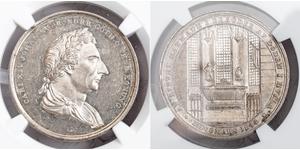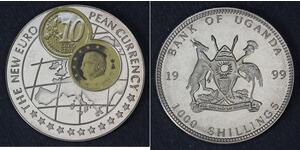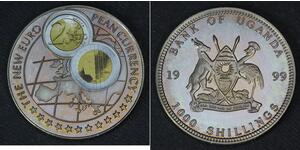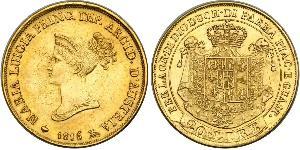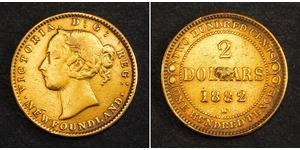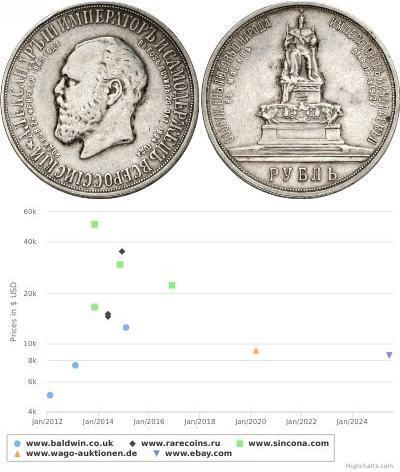(售价 $315.0)
1814, Frankfurt (Free City). Silver "Volunteers" Award Medal (City Thaler). RR!
Mint Year: 1814 Mint Place: Frankfurt Mintage: Only 350 pieces awarded! Reference: J & F 1782, Nimmergut 814. Very Rare! Condition: Scratches, harilines and digs in fields, otherwise a nice XF-AU! Denomination: Award Medal (also known as "City Thaler")- Awarded to all individuals who voluntarily participated in the campaigns against Napoleonic France in 1814. Weight: 14.38gm Diameter: 34mm Material: Silver
Obverse: Crowned eagle of Frankfurt with outstretched wings with the letter "F" on its chest, below the eagle is the inscription "S.P.Q.F." (Senatus PopnlusQue Francofurtensis - "The senate and people of Frankfurt."). Legend: * GOTT SPRACH ES WERDE LICHT UND ES WARD LICHT ("And said God let there be light, and there was light.") - The phrase comes from the third verse of the Book of Genesis. In the King James Bible. Reverse: Inscription if four lines (FÜR DEUTSCHLANDS BEFREIUNG 1813.1814. = "For Germany´s relief, 1813-1814.") within inner circle. Legend: * SCHAAR DER FREIWILLIGEN VON FRANKFURT AM MAIN ("Army (crowd) of volunteers of Frankfurt am Main.")
The war memorial for the 1813/1814 campaign was donated by the Senate of the City of Frankfurt am Main on July 5, 1814 and awarded to citizens of the city who had voluntarily taken up arms to participate in the war of liberation against Napoléon. In total, the medal was awarded six times in gold and around 350 times in silver. The bronze medals were not awarded.
Let there be light" is an English translation of the Hebrew יְהִי אוֹר (yehi 'or) found in Genesis 1:3 of the Torah, the first part of the Hebrew Bible. In Old Testament translations of the phrase, translations include the Greek phrase γενηθήτω φῶς (genēthētō phōs) and the Latin phrases fiat lux and lux sit.
Following the French Revolution, Frankfurt was occupied or bombarded several times by French troops. It remained a free city until the collapse of the Holy Roman Empire in 1805/6. In 1806, it became part of the principality of Aschaffenburg under the Fürstprimas (Prince-Primate), Karl Theodor Anton Maria von Dalberg. This meant that Frankfurt was incorporated into the confederation of the Rhine. In 1810, Dalberg adopted the title of a Grand Duke of Frankfurt. Napoleon intended to make his adopted son Eugène de Beauharnais, already Prince de Venise ("prince of Venice", a newly established primogeniture in Italy), Grand Duke of Frankfurt after Dalberg's death (since the latter as a Catholic bishop had no legitimate heirs). The Grand Duchy remained a short episode lasting from 1810 to 1813, when the military tide turned in favour of the Anglo-Prussian led allies that overturned the Napoleonic order. Dalberg abdicated in favour of Eugène de Beauharnais, which of course was only a symbolic action, as the latter effectively never ruled after the ruin of the French armies and Frankfurt's takeover by the allies.
Frankfurt was one of the most important cities in the Holy Roman Empire. From 855 the German kings and emperors were elected in Frankfurt and crowned in Aachen. From 1562 the kings/emperors were also crowned in Frankfurt, Maximilian II being the first. This tradition ended in 1792, when Franz II was elected. His coronation was deliberately held on Bastille Day, 14 July, the anniversary of the storming of the Bastille. The elections and coronations took place in St. Bartholomäus cathedral, known as the Kaiserdom (en: Emperor's Cathedral), or in its predecessors.
The Frankfurter Messe (Frankfurt Trade Fair) was first mentioned in 1150. In 1240, Emperor Friedrich II granted an Imperial privilege to its visitors, meaning they would be protected by the Empire. Book trade fairs have been held in Frankfurt since 1478.
In 1372 Frankfurt became a Reichsstadt (en:Imperial city), i.e. directly subordinate to the Holy Roman Emperor and not to a regional ruler or a local nobleman.
2 Dollar 加拿大 金 维多利亚 (英国君主)
本组有 39 钱币 / 38 售价
⇑








